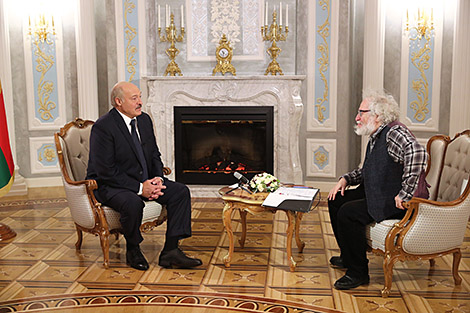Events
Acceptable terms for tighter Belarus-Russia integration identified

MINSK, 24 December (BelTA) – The terms Belarus deems acceptable for the sake of enabling tighter integration with Russia and the factors that make the process so difficult were described by Belarus President Aleksandr Lukashenko in his interview with Editor-in-Chief of the radio station Ekho Moskvy [Echo of Moscow] Aleksei Venediktov, BelTA has learned.
The head of state quoted some statistics of Belarus-Russia trade. For instance, he referred to Belarus’ foreign trade deficit of $9 billion and the fact that the total deficit of merchandise trade with Russia in 2000-2019 exceeded $120 billion. “Nobody on your side wants to hear about it! While in 2000 Belarus accounted for 11% of Russia’s import, in 2019 the figure dropped to half of that – 5.5%,” the Belarusian leader stressed. “It is falling. What kind of a union is that?”
He continued: “Let me ask you a rhetorical question: what kind of a union is it if things are getting worse and worse across the board? But Russia doesn’t want to analyze it. It doesn’t need to. For some reason Russia wants to prove that [Belarus] is a freeloader, that Lukashenko is no good, that he is a whimsical man at least. Total nonsense.”
Asked why it happens, the head of state said: “You had to reduce the degree of Lukashenko’s acceptance in Russia.”
The president reminded that right after the Treaty on the Establishment of the Union State of Belarus and Russia was signed, he suggested and even insisted on arranging a referendum to pass the Constitution, which had provisions for everything starting with the common currency and ending with supranational bodies. “Why did you not want to do it back then?” Aleksandr Lukashenko wondered. “You were afraid that Lukashenko will sit in the Kremlin, will snatch the crown of the Russian tsars, and take it away to either St Petersburg or Minsk god forbid. This is what you were afraid of. Although it was not worth a dime.”
Speaking figuratively about the development of the Union State of Belarus and Russia, Aleksandr Lukashenko noted that they had started building the house from the top and had remembered many basic issues only after a lengthy period when the time to deal with them was already lost. A new generation that appreciates independence and sovereignty now lives in Belarus and Russia. “Time is irrecoverably lost, this is why we cannot resolve the problem the way you want it today: let’s make this guy the president, this body will act as the parliament, we are going to build everything from the top right now,” Aleksandr Lukashenko said. “If we do that, we will get such an outburst tomorrow… Not only in Belarus, but in Russia as well. Do you know how many Russians say ‘Tell Lukashenko that Belarus shouldn’t join Russia’? How many people say that? Why do they say it? Not because they don’t like Lukashenko and Belarus but because they are afraid that Belarus may become an oligarchical country. That’s what they are concerned about.”
The head of state insists that any integration processes must proceed on an equal footing, for instance, the way it happens in the European Union where all countries regardless of their size, the development of the economy, and other factors have an equal say in the matters. “But Russia tells us: We are big, you are smaller, it means things will be the way they are done in Russia. I happen to disagree. Let’s make common legacy out of the things Russia does better. And Russia could borrow some Belarusian practices.”
As an example Aleksandr Lukashenko mentioned regulations on trade in tobacco products and alcohol. They are different in Belarus and Russia and the Belarusian ones are better. However, Russia has yet to agree to adopt this practice within the framework of the Union State of Belarus and Russia.
 During the interview Aleksei Venediktov mentioned the commonality of views of Aleksandr Lukashenko and Vladimir Putin. Aleksei Venediktov wondered why the two politicians cannot come to terms while they pursue roughly the same line of logic.
During the interview Aleksei Venediktov mentioned the commonality of views of Aleksandr Lukashenko and Vladimir Putin. Aleksei Venediktov wondered why the two politicians cannot come to terms while they pursue roughly the same line of logic.
Aleksandr Lukashenko responded by saying: “We are politicians. The things we say may seem identical. But making statements is one thing while acting on your statements is another. It is more difficult.”







 print version
print version make home page
make home page add to bookmarks
add to bookmarks

